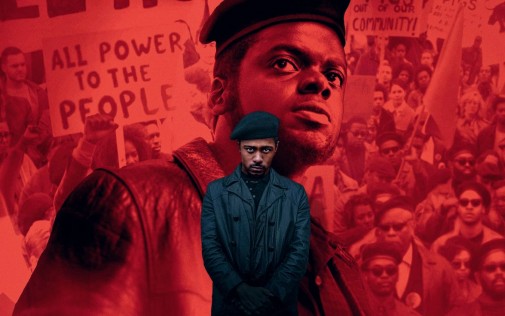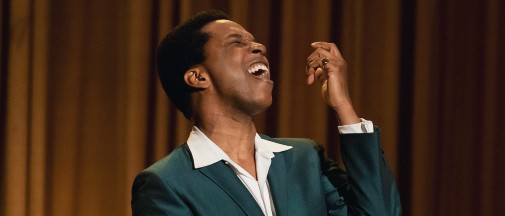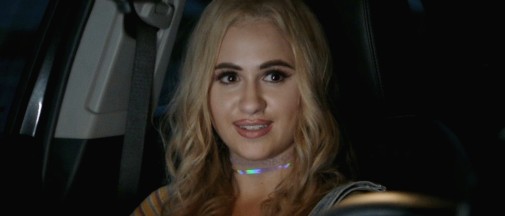What's the worst case of "category fraud"?
 Wednesday, March 17, 2021 at 11:13AM
Wednesday, March 17, 2021 at 11:13AM 
Some people don't care about "category fraud" and that's understandable. I'm a big proponent of just being happy that great artists are honored, ignoring the categorization of their work, especially when it's all so subjective. However, when it comes to the Oscar acting prizes, it does feel wrong that awards specifically created to honor character actors are now regularly dominated by stars in leading roles. Instead of opening avenues to highlight those performers with less narratively-prominent parts, the Supporting categories have become a way for leading actors that couldn't crack the leading prizes to still win gold. This game of fraudulent campaigning may have just hit its apex with this year's slew of Best "Supporting" Actor and Actress nominees.
To organize my thoughts and hopefully make the arguments clearer, here's a ranking of the "category fraud" cases of the year from least to most egregious. This is all subjective, though I'd side-eye anyone who tried to argue for the legitimacy of that top choice...

Sacha Baron Cohen in THE TRIAL OF THE CHICAGO 7
Aaron Sorkin's Best Picture hopeful is an ensemble piece, which means that it's difficult and very dubious to separate its cast between leads and supporting roles. Nonetheless, the script is so unbalanced in how it treats the titular Chicago 7 that some characters rise above the others in terms of relevancy and POV. I'd say Sorkin structures the movie around the ideological conflicts of Eddie Redmayne's Tom Hayden and Sacha Baron Cohen's Abbie Hoffman, making them into protagonists, much to the movie's detriment.

Olivia Colman in THE FATHER
The film is about the relationship between father and daughter and, while his POV dominates, she also has moments alone without the patriarch. My love for The Father comes, in part, from the juxtaposition of two different experiences of the same prolonged situation. We get to watch a mind lost to dementia from within and also from outside. Plus, when sharing scenes, Colman is usually the one modulating tone, guiding Hopkins through confusing events. Even though Olivia Williams sometimes steps into Colman's shoes for added disorientation, the Best Actress champion of 2018 is still a co-lead in my eyes.

Leslie Odom Jr. in ONE NIGHT IN MIAMI…
Similar to Baron Cohen, Leslie Odom Jr. acts in an ensemble picture that divides its narrative between multiple individuals. Despite this, just like in Trial of the Chicago 7, the script of One Night in Miami… constructs itself around one principal ideological conflict with two characters arguing throughout the main part of the film. They are Kinglsey Ben-Adir's Malcolm X and Leslie Odom Jr.'s Sam Cooke. Furthermore, both the real-life people's early deaths haunt the movie and lay a mournful veil over it. The conclusion of the entire affair also focuses on Cooke, implying his experience and personal arc are what defines the theme and structure of Regina King's movie.

Maria Bakalova in BORAT SUBSEQUENT MOVIEFILM
Borat's sequel is about Borat, for sure. However, one element makes it stand apart from the original and redefines the tone of the comedy even as the mechanics of it remain constant. That element is Maria Bakalova's Tutat, Borat's daughter, and the gift he plans to give to American politicians. Her presence completely reconfigures the movie, giving it a narrative arc, an earnest sensibility so at odds with the original it manages to elevate the sequel above its predecessor. Such a central part of the film deserves to be considered a co-lead. What is Borat Subsequent Film's story if not the evolving relationship of this father-and-daughter duo?


LaKeith Stanfield and Daniel Kaluuya in JUDAS AND THE BLACK MESSIAH
This is ridiculous. Judas and the Black Messiah is a classic two-hander, a story told about and from the perspective of two individuals whose experiences intersect. Daniel Kaluuya's campaign as a supporting actor was already ridiculous enough, but to nominate LaKeith Stanfield alongside him just makes these nominations all the more preposterous. In one regard, I love the fact Kaluuya is a two-time nominee and that Stanfield was nominated. They're great actors who have many Oscar-worthy works in their respective filmographies. That being said, I also wonder what genuinely supporting actors were ignored in order for AMPAS to reward these leading men.
Think of how insane it would look for both Thelma and Louise to be named supporting players in the movie titled after them. Who is the lead of Judas and the Black Messiah if not Judas (the betrayer) nor the Black Messiah (the great man who is betrayed)? If the Academy wanted to nominate these two so much, why not recognize them in the leading actor category? In truth, that might have been what happened. If AMPAS ever releases their vote totals, I wouldn't be surprised if Kaluuya ranked higher than some of the actual nominees in the Best Actor race and just ended in Supporting because that's where he got more votes, overall.
Considering all of this, I think this year's Best Supporting Actor category may very well be the worst example of category fraud ever. There's only one inarguable supporting player among the bunch, the less famous of the recognized actors, Paul Raci for Sound of Metal. In the past, it's been common for more than half of the category to be made up of leads but it's never gotten to this level of absurdity. For instance, while I consider all of the Best Supporting Actress nominees of 2006 to be in the wrong category, all but Cate Blanchett are somewhat defensible cases that came from ensemble movies where it's trickier to assess and decide who's at the center(s) of the dramatic story.
The last time we saw Supporting lineups comprised of only supporting players was 2011 for men and 2017 for women. Of course, that's my assessment and I'm sure many would disagree. Nonetheless, I find it concerning that this trend is becoming somewhat akin to an unwritten rule. So much so, that people's opinions on the Oscar contenders seem to be skewed, making genuinely supporting actors have to contend with criticisms of their roles being too small. I recall conversations like that occurring when Mahershala Ali won the Oscar for Moonlight and when Regina King conquered her trophy for If Beale Street Could Talk and remain baffled by them. Of course, their roles are small – they are supporting characters, not protagonists.
Thankfully, both performers managed to win the gold, defeating such lead actors as Dev Patel in Lion and The Favourite ladies. While trying to keep positive, I fear that such results may become increasingly rarer and that AMPAS will continue to do nothing to rectify that. For all their many faults, the HFPA has committees that examine these category placements and rule in favor or against the studio's campaigns. It doesn't seem like that would be so hard to implement and, even if the rulings wouldn't always be universally accepted, they surely would result in fewer eyebrow-raising lineups.
I'd love to know your opinion on this subject. Do you, dear readers, care about "category fraud"? How would you rank this year's examples and what lineups do you consider to be the most "fraudulent" in Oscar history? Please, sound off on the comments.



Reader Comments (108)
I don't see Baron Cohen as the lead of Chicago 7. It's perfectly possible for a movie to have no leads.
But the Odom/Stanfield/Kaluuya situation is insulting. And I feel like the uproar about Stanfield will make it worse somehow, because the question now seems to be getting framed as "Well then who is the lead?" when the actual problem is that people like to pretend that a movie can have only 1 lead.
I do care about category fraud and worry that if this keeps up, the "supporting" category will just be filled with five more leading roles. I do think this year might be the one that causes the Academy to come up with some sort of rule about how to police this sort of thing.
And just so I'm clear, are you saying that if Lakeith Stanfield got a thousand votes for Best Actor and came in fifth in that slot, if he got a thousand and one votes in Supporting he would HAVE to be put into that category? Have I got that right? I've never known that's how it might work.
Rooney Mara for Carol still takes the cake for me.
As Mike says, "It's perfectly possible for a movie to have no leads." Think NASHVILLE. But, yeah, it's really becoming problematic.
Screentimecentral has full leading actress and supporting actor screentimes, and partial for the other two categories.
I think Bakalova, Cohen, and Colman are pretty clearly supporting actors in their films. Bakalova and Colman's films have obvious leading characters, and Cohen's films is one of those where everyone seems like a supporting player (a la Spotlight).
When people cry "category fraud" when it doesn't exist - such as these three cases - it dilutes the argument when the real problems occur.
I do not care about category fraud because the distinction between a lead and a supporting performance is arbitrary, and everyone has their own definition of the category. As a result, everyone argues with one another using their own definition. For example, is Anthony Hopkins a lead or supporting performance in The Silence of the Lambs? Is Greer Garson a lead or supporting performance in Goodbye, Mr. Chips? One commenter has one definition of the categories and strenuously argues their point. Another commenter has a different definition of the categories and fervently argues their point. Both people are arguing past one another, which leaves each party further aggravated. Personally, that seems unproductive to me.
I am in TOTAL agreement with you
Some cases of category fraud bother me more than others, and the only ones that truly bother me this year are the Judas and the Black Messiah actors. I mean, Maria Bakalova is clearly a co-lead, but it’s at least defensible to place her in supporting on the grounds that it’s still MORE about Borat than Tutat, and from a campaign standpoint, this is her breakthrough role, and those always tend to go supporting if there’s even a halfway decent case to be made for doing so.
Ethan Hawke in Training Day still stands out to me as perhaps the most egregious example of category fraud over the past 20 years at least. He’s onscreen for almost the entire movie, it’s told from his character’s point of view, and he was already a star when it was released. That was clearly a case of putting him in supporting simply because his costar (who had less screentime, by the way) had the flashier role.
I’m curious how others feel about this, but I actually don’t feel as bothered by category fraud the other way around, i.e. an arguably supporting role being campaigned as a lead. Because I like to make room for as many genuinely supporting players as possible, my policy is that if I’m ever torn on whether it’s a lead or supporting role, I’ll just go with lead. So while I do think Anthony Hopkins in The Silence of the Lambs, for instance, could probably have gotten away with a supporting campaign due to his relatively limited screentime, I don’t have a problem with him winning Best Actor that year.
About Stanfield: I'm guessing he showed up a lot as second place on the Kaluuyah ballots and Kaluuyah is that much of a favorite to win that he ended up helping his co-star to score a nomination.
Timothy Hutton in "Ordinary People" is the first one I think of. Isn't he in 90% of the movie? Maybe even more?
Mike -- i agree with you that the problem is this pretending that movies can only have 1 lead. that's what pushes all the same gender duet films to commit these fraudulent campaigns. It's also telling that so few people, when this argument comes up, ever realize how much damage it does to character actors who a) make less money b) are less famous and c) are valued less for their artistry and d) get less opportunities to change a, b, and c if they're also denied the opportunity to get an Oscar nomination if they do outstanding work.
There are so many examples of fraudulent supporting campaigns blocking really excellent character actors from being honored for great work and sometimes it is even an indirect disrespeect to artist from the same film! I Recently Rooney Mara's supporting campaign in CAROL totally prevented people from realizing or at least considering how wonderful Sarah Paulson was in the same film.
Ethan Hawke in Training Day, Emma Stone in The Favorite and Rooney Mara in Carol are some of the worst examples of this in recent years.
Could we have a list of the most infamous cases? I think visibility about this subject has been quietly but rapidly growing in the past years and it could be a good time now with the Judas SNAFU to make a good case with examples and information :)
I should also add that the terms "lead" and "co-lead" are used, too. Is a lead performance larger or more prominent than a co-lead, or are these two terms equal to one another? Different people use these terms differently.
On the other end, there are very short performances that are considered cameos. Some argue that someone doesn't have enough screentime to be nominated (e.g., Ellen Burstyn in Pieces of a Woman or Hermione Baddeley in Room at the Top). So does this mean that the supporting categories should be split further?
Are there 4 levels of performance: lead, co-lead, supporting, and cameo? My head spins.
Edwin -- i dont feel bad about the other way around because promotions are for doing outstanding work. and you cant really argue with a straight face that movie stars have too few opportunities to be honored or thanked for their skills so nobody is taking anything away from them when the rare 'other way around' happens.
it's all so ridiculous because there are hundreds of more supporting players every year than leads and yet they get fewer opportunities. It's even worse at SAG and Globe where leads get multiple categories but supporting playrs have to share one. (and then there are still leads there hogging those even fewer slots)
Ken -- i dont feel we need to have multiple levels. we just need people to not egregiously lie about the levels we currently have ;) yes there are gray areas but many black and white cases get away with pretending that they're gray because everyone has looked the other way for so long.
If I were in the position of how to tell the Academy how to kill fraud entirely? They'd need to do two things at the same time to even have a chance: 1. A nomination expansion to 10 (for the "we still want to nominate this, even if it won't win" frauds (like Julia Roberts in August: Osage County or Philip Seymour Hoffman in Charlie Wilson's War) AND a medalist system (for the "we want this to WIN, not JUST get nominated" frauds (like Javier Bardem for No Country or Viola Davis for Fences), because just doing the former would only reduce fraud, not kill it completely. And they should shoot for killing it completely.
Yes! Every time I hear about a role being too small for awards consideration, I want to scream! I don’t care if someone only has one scene in a movie with no character arc—if it’s a great performance, then by all means nominate them. A case in point this season: Allison Brie in Promising Young Woman.
As for category fraud, the only way to end it is for voters to ignore such nominees and give the awards to the real supporting players until studios see no benefit in pulling that nonsense.
(Mahershala Ali going from a true Supporting win to an egregious Lead-in-Supporting win was pretty irksome.)
Ethan Hawke in TRAINING DAY and Jamie Foxx in COLATTERAL still boggle the mind as "supporting" actors.
I'm not sure I'm totally sold on the premise of your argument that the supporting categories were created to "honor character actors." It seems more like the division is an attempt at leveling the playing field because it's otherwise difficult to assess a performance with a few key scenes against a performance by an actor that dominates their film and appears in nearly every scene.
That said... there are still egregious examples where that effort to level the playing field is rendered totally void. Roonie Mara and Brad Pitt's recent campaigns are good examples. JUDAS seems like one of the most egregious cases in recent memory though. I didn't have a problem with Kaluuya's supporting campaign as his character is off screen for long stretches of the film (even though the plot revolves around him regardless). Stanfield's nomination, however, is as absurd as anything we've seen in this category before. The two together seem to make the category divisions between lead and supporting actor a total joke.
I remember being quite confused at Alicia Vikander’s march to Oscar as the “Supporting Actress” in The Danish Girl. She is clearly the lead actress and co-lead of the film. Very irritating.
The exact same thing for Rooney Mara in Carol. Imagine if Blanchett and Mara were both nominated in supporting for Carol. The outrage would’ve been 10x as bad as what has happened to Judas and the Black Messiah.
For what it’s worth, according to Screen Time Central, six performances over the past 20 years have been nominated in the supporting categories despite being onscreen for a majority of their films. They are:
Ethan Hawke, Training Day (2001)
Jamie Foxx, Collateral (2004)
Cate Blanchett, Notes on a Scandal (2006)
Hailee Steinfeld, True Grit (2010)
Rooney Mara, Carol (2015)
Mahershala Ali, Green Book (2018)
There are plenty of others that feel like egregious category fraud in the 40-50% range of screentime, but those are the ones that were actually onscreen for a true majority of the film and were still nominated as supporting roles.
The first time I was flabbergasted at a lead being placed in Supporting was Al Pacino in The Godfather. He had the biggest role in the film!
Even earlier, when I saw I realized that in My Cousin Rachel, Richard Burton is in EVERY scene but one in the film, while even Olivia deHavilland comes and goes during the film.
And the Academy Award for Best Actor in a Leading Role goes to....Jessie Plemons for Judas and the Black Messiah.
The biggest problem with this trend is that it pushes aside really great, small performances, especially from less well known actors. I can't imagine someone like Beatrice Straight being nominated today. The fact that Michelle Williams made it in for a small role in 2016 is more of a testament to her star power. Had that been played by an unknown, it would have been ignored. I think that's why Paul Raci feels like such a triumph this year.
I still find Emma Stone's placement in supporting for The Favourite to be a problem. Not only was she amazing and deserving of a nomination, but she was the clear lead.
I feel less torn about Cohen - I think the film paints Hayden as the lead. For the most part, it's an ensemble film. Similarly, the Odom thing bothers me less because it's an ensemble film.
Bakalova is clearly a lead and the narrative heart of her film. The Judas thing is a problem if only because they both were nominated, so it's especially glaring. It reminds me of Ellen Burstyn in Mrs. Harris. A nomination so glaring that it embarrasses the academy.
From screentimecentral.com:
Daniel Kaluuya (Judas and the Black Messiah) - 46:09 / 36.80%
LaKeith Stanfield (Judas and the Black Messiah) - 49:51 / 39.75%
Leslie Odom Jr. (One Night in Miami) - 54:20 / 47.52%
Is it true that Stanfield campaigned as lead? Does it still qualify as "category fraud" if the actor campaigned as lead, but still ended up in supporting? Of course, this doesn't take away from the larger point being discussed (that many leads in recent years have actively and fraudulently pretended they are supporting).
Most of child actors:
Tatum O'Neal (Paper moon)
Hayle Joel Osment (The sixth sense)
Hailee Steinfeild (True grit)
Robert Altman movies don't usually have a clear protagonist (Nashville, Short cuts, Gosford Park)
And of course the ladies:
Julianne Moore (The hours)
Rooney Mara (Carol)
Viola Davis (Fences)
Also from screentimecentral.com
Paul Raci (Sound of Metal) - 18:21 / 15.19%
Sacha Baron Cohen (The Trial of the Chicago 7) - 30:14 / 23.23%
Jennifer Hudson being supporting in Dreamgirls baffles me. We all remember Holliday's turn in the character that got her a Tony for leading actress. But just because Beyonce was in the movie, the same character was considered supoorting, even though Effie conducts the whole story, including Deena's arc.
The "category fraud" conversation is such a big one to have and honestly it's not as if it's a recent trend. From the introduction of the supporting categories there has been cases where fraud occurred (i.e. Roland Young, Topper, Jennifer jones, Since You Went Away) and honestly it's depressing as a fan of cinema. The act of playing a supporting role is vastly different than that of a leading role and when the intention of the category was to award these reliable character actors of the golden age of movies it makes one yearn for the days when 5 minuite roles were recognised.
The academy has been trying to introduce many awful rule changes in the past decade and I want to be hopeful that sometime can be done about this category fraud situation. Sure great actors are being nomination but when an actual supporting role struggles to gain traction because some say
"the role is too small"
"maybe if they had one more scene"
it asks the question aren't supporting roles supposed to be small. I remember back in 2016 people weren't sure Mahershala Ali would contend because his role is so small and disappears quite early into the film. At the time and still it frustates me because of course his role is small, IT'S SUPPORTING.
I will admit the debate seems more intense on film twitter but other than Diane Ladd who I consider the patron saint of the category fraud conversation no industry people seem to have "that conversation"
Vikander and Mara are some of the recent worst,Vikander won an Oscar for a film that didn't deserve it and in the wrong category,she'd never have won Lead,I wouldn't mind Mara loosing Lead as long as she is nominated in the right category.
It needs looking into,maybe be more like the Globes,more specific.
For me the worst is Jamie Foxx in Collateral. There is really no justification for that being a supporting role, and we all know he was campaigned there because he wouldn’t be nominated for a lead Oscar for that role.
What about Cameos that are deemed supporting a few of the top of my head,should a one scene wonder count as supporting
Beatrice Straight Network
Hermione Baddeley Room at the Top
Ned Betty Network
Jane Fonda Youth
William Hurt A history of violence
Marjorie Rambeau Torch Song.
Aside Al Pacino for The Godfather there's ever been any of the actors nominated that called the thing out?
Diane Ladd is one of us:
https://youtu.be/EbCN6E84vB8
And what about Viola Davis. First she wins a Supporting Actress Oscar for what I considered a leading role. Now she's nominated as Lead Actress for what I consider a supporting role.
@ markgordonuk
ALL supporting, period.
PP- Samuel L. Jackson has publicly stated he wanted to be campaigned as a lead for Pulp Fiction. And not for himself, but Woody Harrelson has publicly said he thought Geoffrey Rush should have been in the supporting category for Shine and thinks that ended up costing him the win that year (although it seems pretty clear to me that Tom Cruise would’ve won Best Actor that year if Rush had gone supporting, so I don’t think he’s correct about that).
End category fraud.
As for Chicago 7? I don't know if this would be all that much closer, but in a courtroom drama movie, I lean on The Lead Is A Lawyer, as a general principle. Which would be Rylance in this case. Cohen and Redmayne are the most prominent members of The Seven, but I still buy them as Supporting.
The whole reason behind the creation of the Best Actor/Actress in a Supporting Role category was to recognize the best in SUPPORTING work. Before 1936, great character actors/actresses were being overlooked in favor of their leading counterparts due to limited screen time/size of role. More screen time means more chances to garner that key "Oscar scene" perhaps?!?. It's sad to see the pendulum swinging so far in the opposite direction that leading actors/actresses are once again overcrowding categories in which they don't belong and displacing supporting players from even having a chance anymore.
I'll add 2 memorable Oscar wins as category fraud...
Javier Bardem was a colead in No Country for Old Men, in my opinion.
Sir Anthony Hopkins was a supporting performance in Silence of the Lambs, also in my opinion.
I am torn about Anna Paquin... I'd almost say that The Piano is an ensemble film with 4 coleads, but certainly the order in importance would be Hunter - Keytel - Neill - Paquin (it's actually sad that Keytel and Neill were snubbed... both would have made my cut for Lead and Supporting respectively... it's a year in which I would probably have given the big 7 to The Piano... (Picture, Director, Original Screenplay, Actor, Actress, Supporting Actor and Supporting Actress... but also Score, Costume as well)
Some people don't care about "category fraud" and that's understandable. I'm a big proponent of just being happy that great artists are honored, ignoring the categorization of their work, especially when it's all so subjective. However, when it comes to the Oscar acting prizes, it does feel wrong that awards specifically created to honor character actors are now regularly dominated by stars in leading roles What pretentious sounds that.
I know a lot of people around the world think that Oscars are the most important movie award but certainly are not, the nominees and winners it proves it by itself that is not like that. Oscars are about Hollywood and Hollywood is an industry, the most important for them is not the art, is the show business.
Is frustrating get into a movie blog expecting to read about films and find articles in which constantly are complain about what Oscar should do and what shouldn't do. You know what? Who cares?
I kinda understand the wish that talented people get rewarded for their work and the lists naming people that never have been recieved a distinction, but if the reward doesn't come, it doesn't matter, the talent is still there and that is the most important. The conversations around the movies doesn't have to be about awards.
I think the clear solution is to do something like the Tonys do. If your name is above the title you are automatically a lead... you can petition to be supporting but thenn they have to make a ruling. (so something like an executive committee for the gray area cases.
but it would be a way to level the playing field. The big stars with the big paychecks and big credits would no longer take honors from character actors unless they really were in a supporting role (but still above the title because thy'r so famous. )
I've alwasy thought the quickest way to stop it was for anyone who chooses to campaign as supporting to have to donate the diffrence between their leading salary and the SAG scale rate for supporting roles. the difference (which would be millions for the big stars) could go to something like The Actors Fund to help actors struggling to pay rent.
I agree with Nathaniel about the Tony Awards and their process. They have clear lead and featured distinctions PRIOR to the awards season. They have very little issue with category fraud since their nominations are overseen by committees.
This latest JUDAS situation is by far the worst example of category fraud in Oscar history as it’s x 2. Kaluuya was already cheating being campaigned as Supporting, but Stanfield also getting in for Supporting is like Pitt and DiCaprio both getting in for Supporting for ONCE UPON A TIME IN HOLLYWOOD. I almost wish that happened so that: 1) DiCaprio’s massive stardom combined with Pitt’s might have been glaring and controversial enough for the problem to finally be addressed, and 2) Pacino could have perhaps won a second Oscar.
The second most egregious example as of late is Emma Stone being campaigned and ultimately nominated for Supporting for THE FAVOURITE. It is her movie more than anyone else’s. She is introduced as someone arriving to the palace with very little, plots her way to the top of the Queen’s court, usurps Weisz as “The Favourite”, gets everything she thinks she wants, and...
(SPOILER)
(SPOILER)
(SPOILER)
...the final frame lands on her more miserable than ever before the infamous multiplying bunnies. Obviously, she has the biggest character arc and, of course, the most screen time.
To Olivia Colman’s credit, she seemed to somewhat call out the absurdity in her BAFTA speech that year, saying something to the effect of, “We should all be the same.” Still, she was a beneficiary of cheating. As great as she is, for me her win will always have an asterisk attached to it.
Reverse fraud (a Supporting or borderline Supporting role going Lead) is far less evil as it’s certainly more noble to punch up rather than down. Hopkins in SILENCE OF THE LAMBS and Patricia Neal in HUD we’re straight up gangster for pulling off Leading wins with such little screen time.
I find Supporting category fraud downright disgusting, particularly when committed by big stars with industry clout. To preserve the integrity and whole reason behind Supporting acting categories, there needs to be a concrete screen time percentage rule going forward and no more of the mental gymnastics people go through to try to justify why a clear or even borderline Lead can be considered Supporting.
I think a 1/3 rule would be fair, as in a Supporting player can’t appear for more than 1/3 of the movie’s runtime. (For a two-hour movie, a Supporting player can’t be onscreen for more than 40 minutes; for a three-hour epic, a Supporting player cannot appear onscreen for more than an hour, etc.) Personally, I’d even be fine with a 1/4 rule so that we might get more great Beatrice Straight in NETWORK wins, but that’s just never going to happen. Might I propose a new Best Cameo or Best Single Scene performance category?
A big problem with making progress on this issue is that the conversation gets nowhere because people end up conflating several things:
Star Billing - "Their names above the title"
Story structure - "The story is about their character, they are the protagonist"
Screen time - "They are in most of the movie therefore they are a lead"
Of these three, screen time should be the focus, since the other two fall apart immediately as any kind of useful metric.
Story structure is far too subjective and whether or not one is a "protagonist" is a separate conversation from whether or not one is a "Lead". I would argue that strictly speaking, Louise is the protagonist of Thelma and Louise but clearly it is a two lead movie, to name but one example.
Star billing is often irrelevant to role size and story structure. Michael Keaton in Beetlejuice is the central character and the name-above-the-title star. So what? He has about 15 minutes of screen time, so he is obviously supporting.
I would add think it would be good for the discourse to admit that there is a very real grey area at play. Everyone is so absolutely certain, I don't get it. Bardem in No Country is a great example. I think both classifications are 100% defensible. Important character with a lot of screen time but also only one third of a triptych structure. Who's to say?
I think Nathaniel is on the right track with some sort of an executive committee. Perhaps every movie can submit classifications that are binding to their eventual categorization. A board then would mostly rubber stamp category choices in a grey area, but which can veto in cases where they are clearly abusing/gaming the system. I dunno, just thinking out loud here.
The Nathaniel tony suggestion is honestly one of the better ones I've heard. I can't remember many fraud situations with that ceremony in recent times (obviously sight unseen when it comes to the yearly productions.)
I made this joke the other day but had Laura Dern become academy president like we all wanted maybe Diane Ladd who has been vocal in the past on the 2015 situation would've suggested her daughter push forward some sort of rule change.
For as much criticism as they get, don't they have a process for certifying where a performer goes? I imagine something like that would help a lot with the academy, even though it would be massively unpopular.